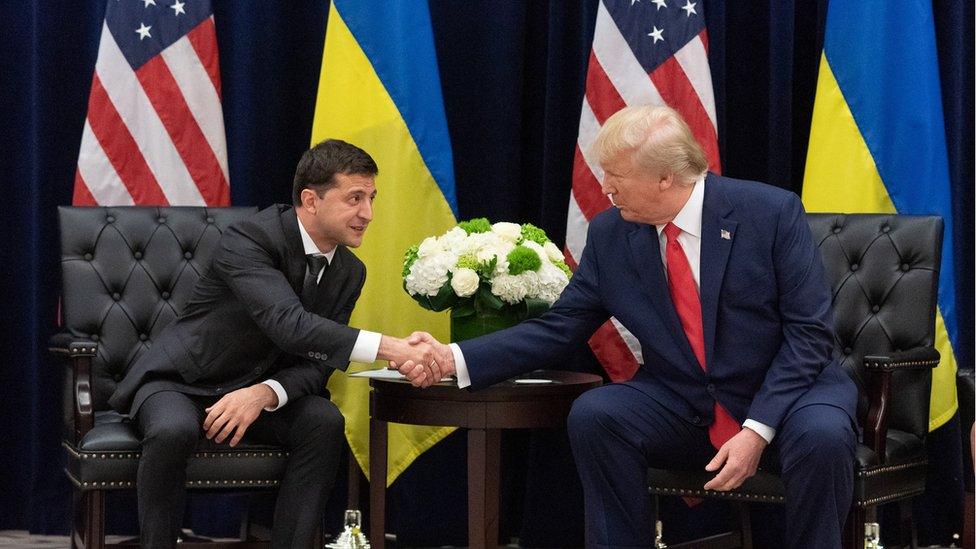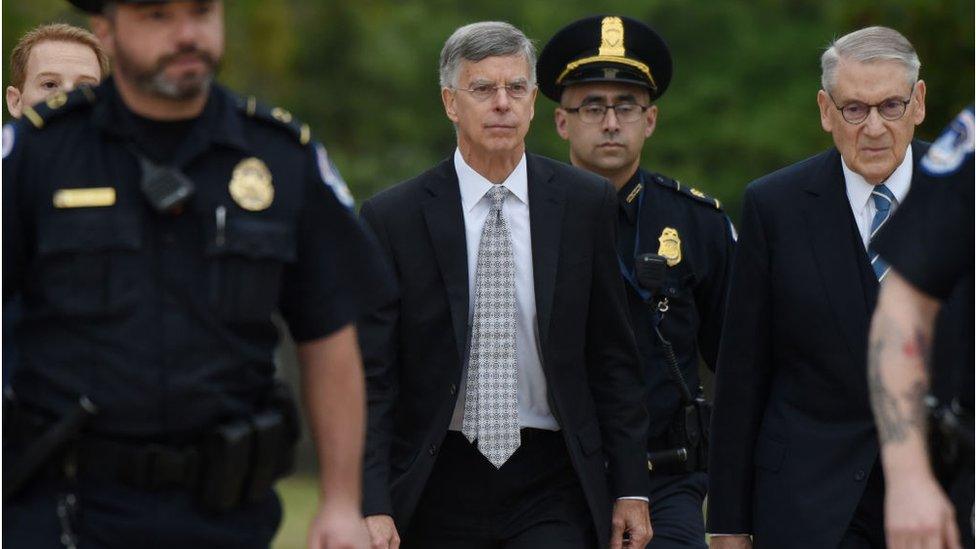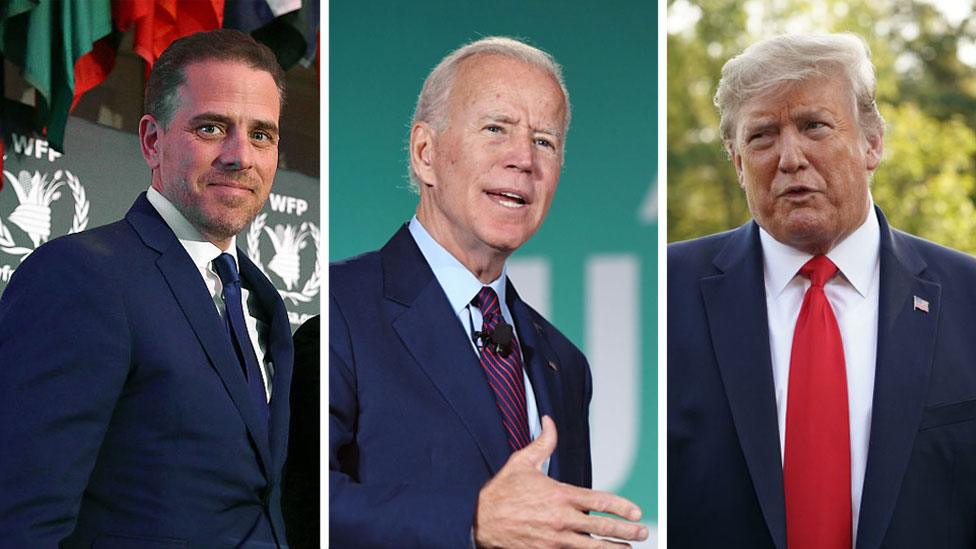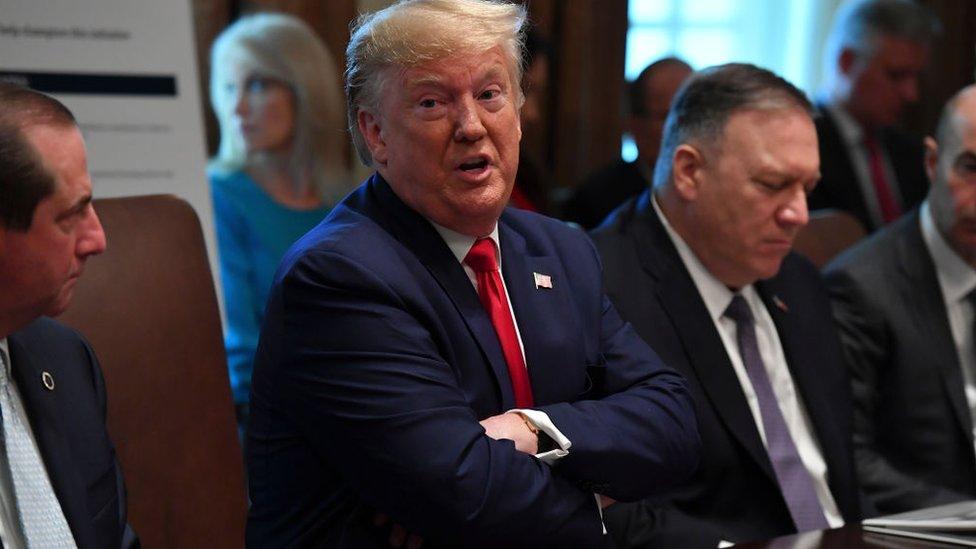Trump impeachment: US envoy condemns 'irregular' pressure on Ukraine
- Published

Ukrainian President Volodymyr Zelensky (left) and US President Donald Trump met last month
A top US diplomat says President Trump made the release of military aid to Ukraine conditional on a pledge that a political rival would be investigated.
Ambassador Bill Taylor testified before an impeachment inquiry that he was told Mr Trump wanted Ukraine to probe ex-Vice-President Joe Biden's dealings.
Mr Taylor said relations with Ukraine had been "fundamentally undermined".
President Trump insists there has been no such deal, or exchange of favours, in Ukraine policy.
Responding to the latest testimony in Congress, White House press secretary Stephanie Grisham said in a statement: "President Trump has done nothing wrong - this is a co-ordinated smear campaign from far-left lawmakers and radical unelected bureaucrats waging war on the Constitution".
One Democrat called Mr Taylor's testimony "the most damning testimony I've heard".
Mr Taylor, a career diplomat who has been the US envoy to Ukraine since June, is the latest witness to testify before lawmakers in the Democratic-led inquiry into suspected abuse of power by President Trump.
A transcript of a call Mr Trump made to Ukraine's new President Volodymyr Zelensky on 25 July shows he urged him to investigate discredited corruption allegations against Mr Biden and his son, Hunter.
While Mr Biden had a key role in US policy towards Ukraine as vice-president, Hunter Biden joined the board of Ukrainian gas company Burisma.
The company had been investigated by former Ukrainian prosecutor general Viktor Shokin.
What did Taylor say?
Mr Taylor told lawmakers that the president had made it clear that he wanted a publicly announced inquiry into the Bidens and alleged Ukrainian interference in the 2016 US election.
"Our relationship with Ukraine was being fundamentally undermined by an irregular, informal channel of US, policy-making and by the withholding of vital security assistance for domestic political reasons," Mr Taylor said in opening remarks carried by US media.
The "informal" channel included US envoy to Ukraine Kurt Volker, Ambassador to the EU Gordon Sondland, Energy Secretary Rick Perry and Mr Trump's personal lawyer, Rudy Giuliani.

Top diplomat Bill Taylor (centre) testified before lawmakers
By mid-July, Mr Taylor said, it was apparent the meeting Mr Zelensky wanted with Mr Trump "was conditioned on the investigation of Burisma and alleged Ukrainian interference in the 2016 US elections".
"It was also clear that this condition was driven by the irregular policy channel I had come to understand was guided by Mr Giuliani."
Mr Taylor also noted that he heard a White House budget and management staffer say she was ordered not to release aid to Ukraine and realised "one of the key pillars of our strong support for Ukraine was threatened".
"I said on September 9 in a message to Ambassador Gordon Sondland that withholding security assistance in exchange for help with a domestic political campaign in the United States would be 'crazy'," Mr Taylor said. "I believed that then, and I still believe that."
Mr Taylor's remarks appear to contradict Mr Sondland's earlier statement before lawmakers, where he said he had had "no discussions" with state department or White House officials regarding the investigating the Bidens.

They call that a 'quid pro quo'

Text messages showed Bill Taylor had issues with the way the White House was conducting its foreign policy toward Ukraine. On Tuesday, he told Congress why - in damning detail.
Much of Mr Taylor's opening statement corroborates other reported accounts of White House efforts to get Ukraine to open investigations that could be damaging to Democrats, and Vice-President Joe Biden in particular. The acting ambassador to Ukraine fleshed out the picture, however, and added new perspective.
In one particular passage, Mr Taylor relates a conversation he had with Gordon Sondland - one of the co-ordinators of what he said was an "irregular, informal channel of US policymaking".
Mr Sondland, he said, told him "everything" - including military aid and a White House visit - was dependent on the Ukrainian president making a public statement that he would order these investigations.
In Latin they call that a "quid pro quo".
The president's defenders will try to undermine Mr Taylor's credibility, although the career diplomat makes for a compelling witness. They may eventually assert that even if Mr Taylor's claims are true, it's still within the president's foreign policy powers.
That will, of course, be up to members of the House - and, perhaps, senators in an impeachment trial - to decide.

Who is Bill Taylor?
William B Taylor Jr, 72, initially served as US ambassador to Ukraine from 2006 to 2009, picked by President George W Bush.
The post he described as "special" was just one job within decades of service to government. He has overseen aid and reconstruction programmes in the Middle East, Afghanistan and Eastern Europe.
When Secretary of State Mike Pompeo asked him to go to Ukraine, Mr Taylor's wife was among those telling him to turn it down. But his close links to the country saw him accept.
Seen as a serial note-taker, Mr Taylor is highly regarded at the state department and among co-workers. His testimony would be hard to dismiss as inaccurate. Ex-Bush aide Nicholas Burns called him a "person of integrity" and "a true patriot".
Mr Taylor also has a notable military background, a West Point graduate whose service record includes a period with the famous "Screaming Eagles" 101st Airborne Division in Vietnam.
What is the impeachment inquiry about?
Three committees in the Democratic-controlled House of Representatives are investigating allegations of wrongdoing by the president.
Democrats accuse him of illegally pressuring Ukraine to dig up dirt on a political rival.
But there is a fierce debate about whether Mr Trump committed an impeachable offence - he himself says he has done nothing wrong.
If the House finds sufficient evidence, articles of impeachment will be put to a vote. If they are approved, proceedings will move to trial in the Senate, which is controlled by Mr Trump's Republicans.
What does it take to impeach a president?
What's the reaction?
Democratic congresswoman Debbie Wasserman Schultz described Mr Taylor's appearance as "the most damning testimony I've heard".
"He drew a very specific direct line from President Trump to the withholding of foreign aid and the refusal of a [presidential] meeting."
Fellow Democrats echoed this idea and praise Mr Taylor's "meticulous" note taking.
Congressman Tom Malinowski said it was the "most thorough" account that filled in "details that some other witnesses, somehow, forgot".
But former acting US Attorney General Matthew Whitaker said on Fox News: "Abuse of power is not a crime.
"Let's fundamentally boil it down, the constitution is very clear that this has to be some pretty egregious behaviour."
Republican congressman Mark Meadows, a staunch Trump ally, told reporters he did not hear "anything that has advanced the quid pro quo or the promise of anything with foreign aid".
- Published5 February 2020

- Published22 October 2019
